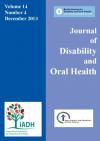Journal of Disability and Oral Health

- Cover Date:
- December 2013
- Print ISSN:
- 1470-8558
- Vol:
- 14
- Issue:
- 4
Editorial - What is the future after specialist training in Special Care Dentistry?
In the final weeks of my training, this is the question weighing on my mind. Since the specialty of Special Care Dentistry (SCD) was recognised in the UK in 2008 the numbers of trainee registrars in the UK has increased annually with approximately 20 dentists currently in training. With 90% of special care patients suitable for treatment in primary care dental services (Faulks et al., 2012), it is important to encourage and support dentists to treat this patient group. At present SCD is recognised in only a handful of countries and the onus is on us, as specialists, to reduce professional barriers and improve attitudes to allow dentists and other members of the dental team to develop their skills and knowledge in providing oral healthcare for the increasing population of people with special care requirements (Scambler et al., 2011). As a non-UK graduate, this led me to consider: whether specialist training translates into working, providing training and integrating into the health and social care systems of other countries. Special care specialists will be essential for providing this training and research, to continue to develop the specialty worldwide. However, what means are there for global networking with other special care dentists? With increasing advances in technology and communication systems a world of opportunity has opened for our growing specialty. During my training a forum for SCD trainees has been developed in the UK and attracted several members from di erent countries, including Ireland and Australia. More recently, through the advent of Facebook, LinkedIn and Twitter, social media provides useful tools to allow free ow of appropriate information, allowing trainees to share ideas. Since the special care trainee Facebook page started in 2012, it has grown to 47 members and continues to attract new international members. Our attitudes should change, as using social media is a liberating way to provide communication between countries, breaking down barriers and promoting inclusion between health care providers, through networking. SCD encourages a patient-centred, bio-psychosocial approach to dental care (Faulks et al., 2012). e dental undergraduate competencies produced by the Association for Dental Education in Europe (ADEE) advocate a ‘holistic approach to the management of patients’ (Cowpe et al., 2010). Standards of dental education and training have been enhanced by European taskforces (Cowpe et al., 2010), and novel approaches to curriculum design have promoted the inclusion of special care dentistry into the European undergraduate dental curriculum and also internationally (Dougall et al., 2013; iADH, 2013). e responsibility for the post- graduate educational needs of dental teams rests on the shoulders of those practising SCD and relies on sharing information, to create seamless interfaces between primary and secondary dental services (Faulks et al., 2012).
- Article Price
- £15.00
- Institution Article Price
- £
- Page Start
- 120
- Page End
- 120
- Authors
- Grace Kelly
Articles from this issue
- Title
- Pg. Start
- Pg. End
- A report on a pilot aimed at improving the oral health of older people within a hospital setting
- 123
- 134
- Oral health status and oral health related quality of life in patients with congenital bleeding disorders
- 135
- 144
- A feasibility study of the use of oral screens in reducing saliva loss in young people with physical and intellectual impairments
- 145
- 152
